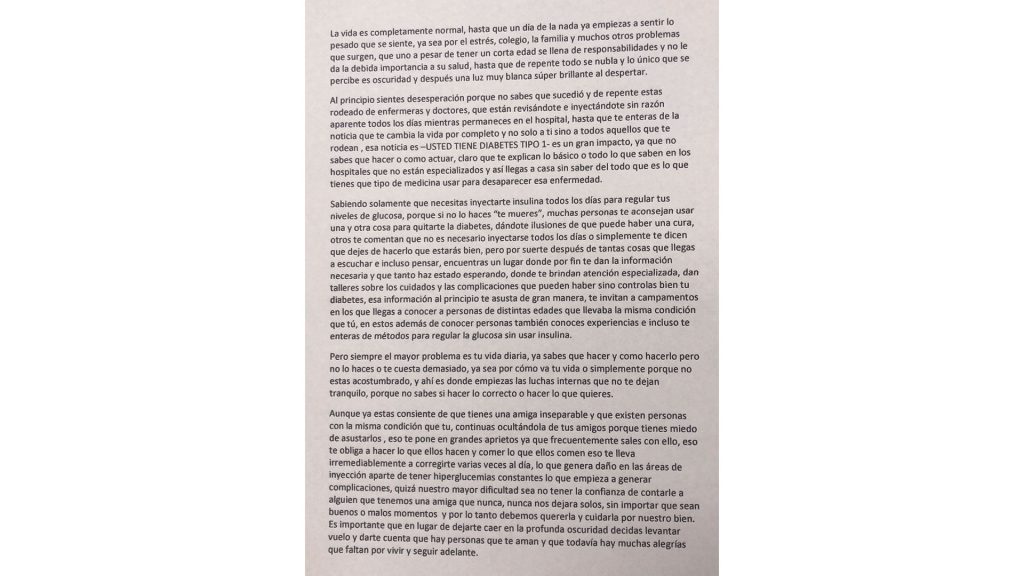Life is completely normal, until one day out of nowhere you start feeling how heavy it is, either due to stress, school, family or many other problems that arise, that despite being young, you feel full of responsibilities and you do not give your health the importance it deserves. Until suddenly everything becomes cloudy and the only thing you perceive is darkness and then a very white super bright light when waking up.
At first you feel hopelessness because you do not know what happened, and suddenly you are surrounded by nurses and doctors who are checking you and injecting you for no apparent reason every day while you remain in the hospital. Until you hear the news that changes your life completely and not only for you but for all those around you, this news is “YOU HAVE TYPE 1 DIABETES.” It is a big impact because you do not know what to do or how to act. Of course, you are explained the basics and everything they know in hospitals that are not specialized and then you get home without fully knowing what kind of medication you have to use to eliminate this disease.
Knowing you only need to inject insulin every day to regulate your glucose levels, because if you do not do it “you will die.” Many people advise you to use this or that to make your diabetes disappear, getting your hopes up that there may be a cure. Others will say it is not necessary to inject yourself every day or just tell you to stop doing it, and you will be fine. But luckily after so many things you hear or even think, you find a place where you are given the necessary information that you have been waiting for, where they provide specialized care, give workshops on care and complications that you may have if you do not manage your diabetes well. That information can be scary at the beginning. You are invited to camps in which you get to know people of different ages who have the same condition as you. Here, in addition to meeting people, you also learn about experiences and even about methods to regulate your glucose without using insulin.
But the biggest problem is always your daily life. You already know what to do and how to do it, but you do not do it, or it is too difficult, either because of how your life is or simply because you are not used to it. And that is where you start the internal struggles that do not let you have peace, because you do not know whether to do the right thing or do what you want.
Although you are already aware that you have an inseparable friend and that there are people with the same condition as you, you continue to hide it from your friends because you are afraid of scaring them. That is a big problem since you frequently go out with them, and that forces you to do what they do and eat what they eat, and that inevitably leads you to correct your glucose levels several times a day, which generates damage in the injection sites apart from having constant hyperglycemia which begins to generate complications. Perhaps our greatest difficulty is not having the confidence to tell someone that we have a friend who will never, never leave us alone. No matter if they are good or bad times and therefore, we must love it and take care of it for our own good. It is important that instead of letting yourself fall into the deep darkness, you decide to take flight and realize that there are people who love you and that there are still many joys that remain to experience and move on.
